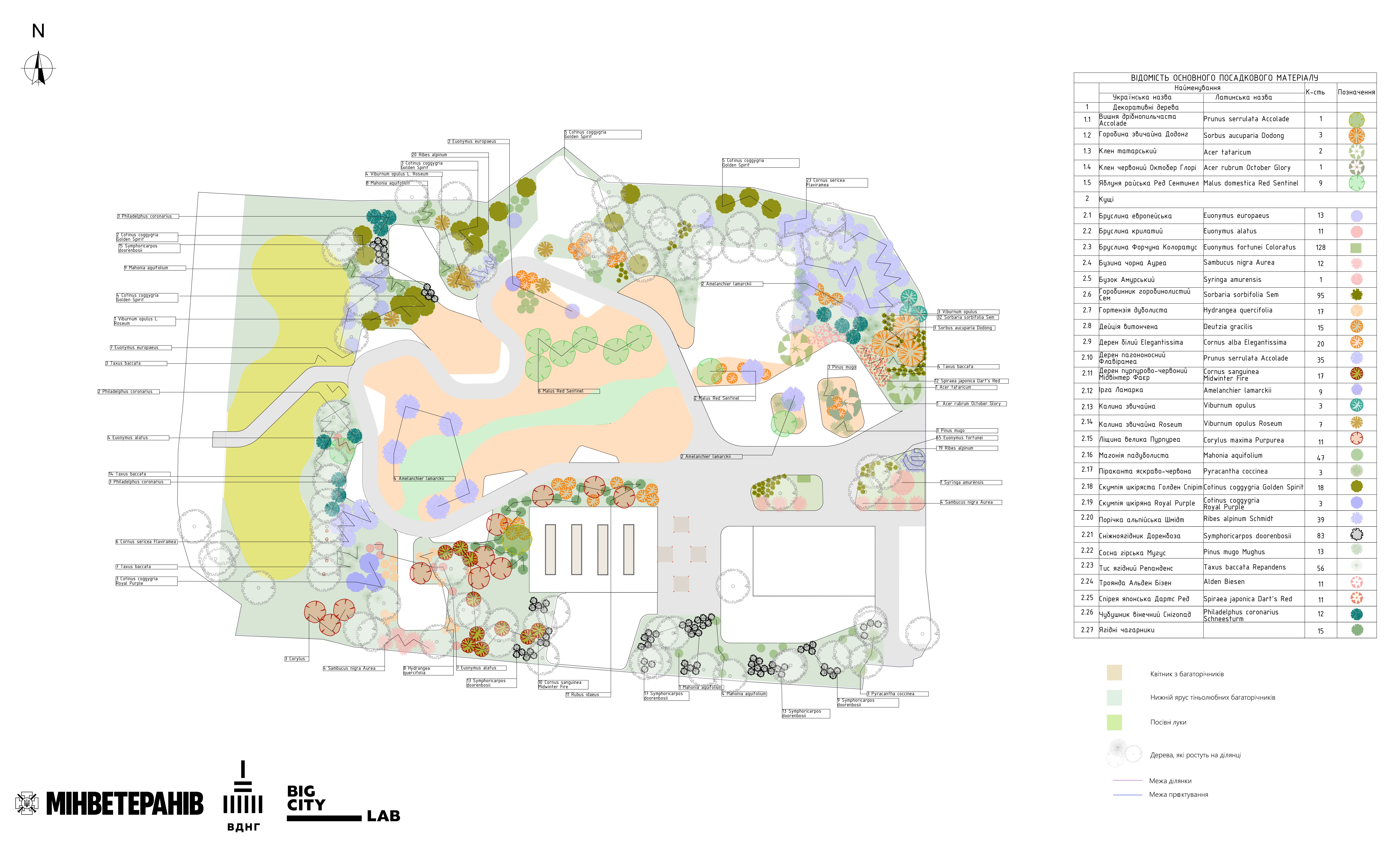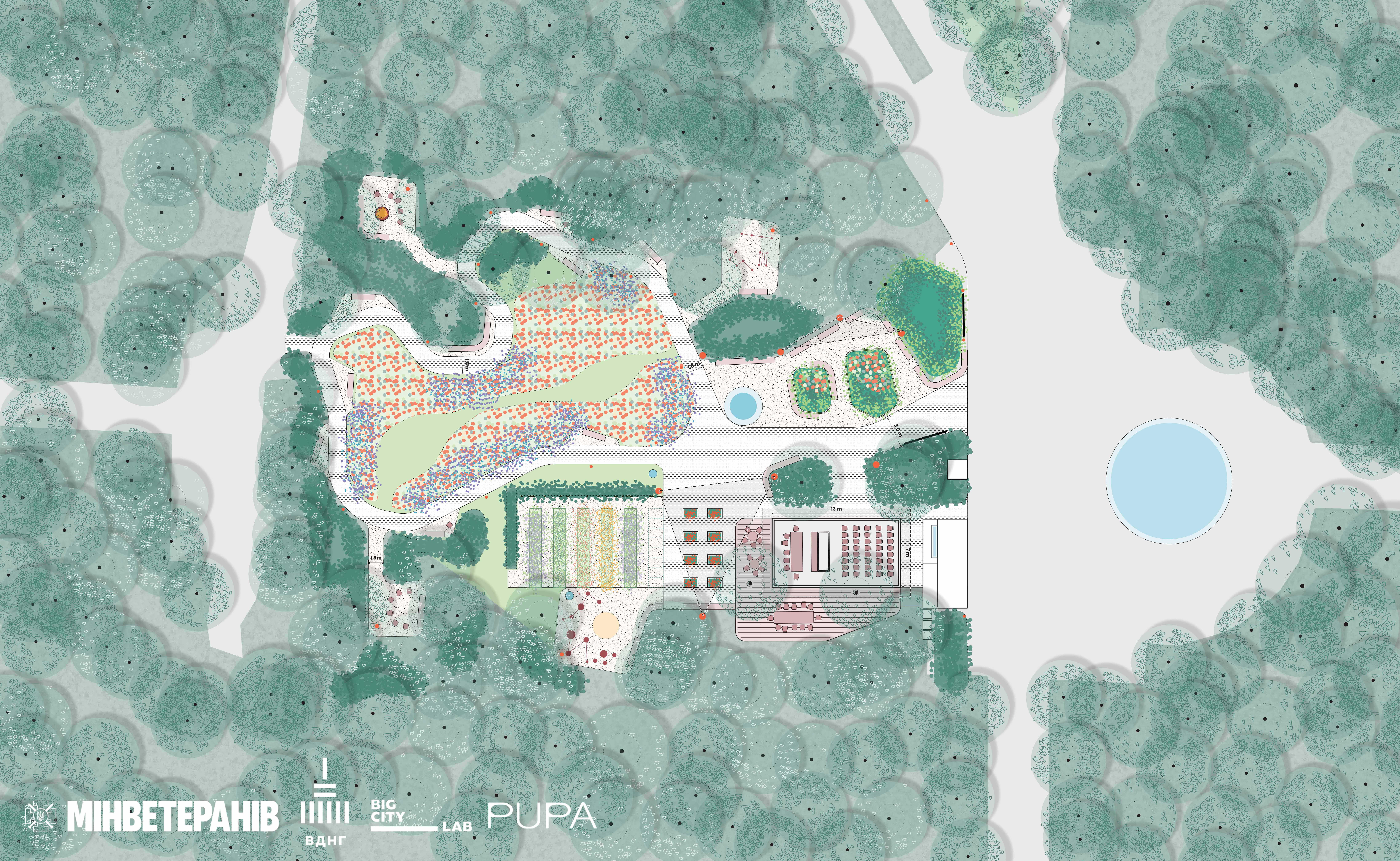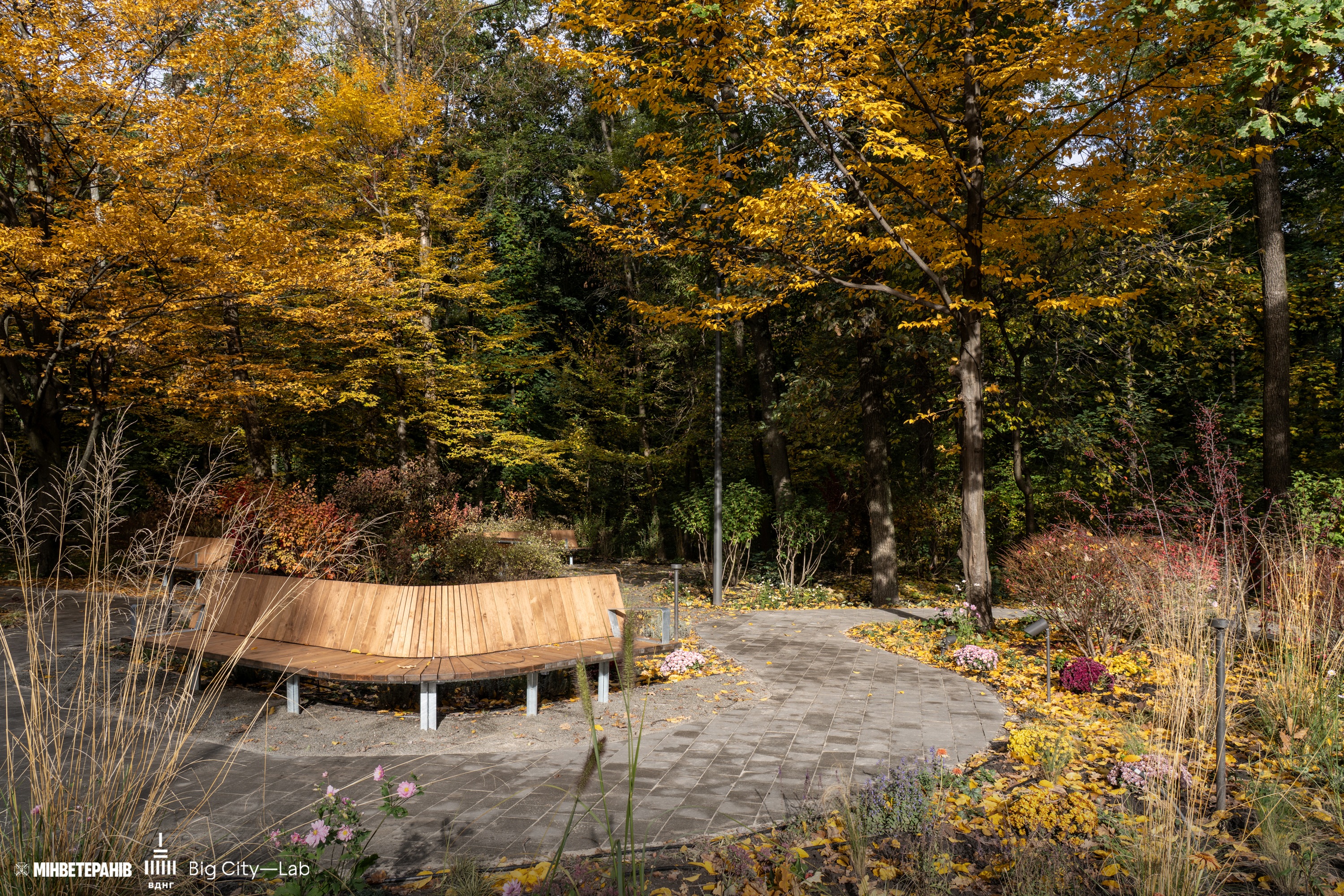.jpg)
The project is being implemented by the National Complex ‘Expocenter of Ukraine’ together with the Ministry of Veterans Affairs as part of the National Strategy for creating a barrier-free space in Ukraine at the initiative of the First Lady Olena Zelenska. The therapeutic garden for the Expocenter is being designed by Big City Lab urban bureau in partnership with PUPA architectural bureau. The project is supported by Visa, PrivatBank, Work UA, Expolight, and the Ukrainian Red Cross.
A therapeutic garden is a public space that will help restore and provide emotional support to veterans, defenders, and anyone else who needs it.
The main idea behind such a garden is that nature restores human health by interacting with visitors through the five senses and engaging them in community activities, creativity and physical exercise. This helps reduce stress, improve mood, speed up recovery after illness or surgery, and improve physical well-being through:
The Therapeutic garden at the Expocenter of Ukraine was opened in October 2025.
After successful testing of the pilot project, such therapeutic gardens may become part of the rehabilitation and post-rehabilitation process in Ukraine. They should appear near hospitals, rehabilitation centres, clinics, and in public spaces in every community.
{{slider-49="/en/sliders"}}
Main functional areas
.jpg)
Plants in Therapeutic Garden
The plants in the Therapeutic Garden have been selected to promote a sense of calm and immersion in nature. In addition to the trees that originally grew on the site, 16 more trees, about 700 shrubs, and over 12,000 perennials have been planted. All species are arranged according to the principle of the natural environment: sun-loving plants are in open spaces in the centre, shade-tolerant plants are closer to the edges of the Garden. This approach creates a natural balance and ensures constant seasonal changes.
The selected plants have different flowering periods, thanks to which the space remains alive and interesting throughout the year.
The garden engages all five senses. Visitors can admire the variety of shapes and colours, listen to the rustling of leaves and birdsong, smell the scents of flowers and herbs, and touch different textures. The trees and shrubs in the garden will also bear fruit that is familiar from childhood.

{{slider-76="/en/sliders"}}
Accessibility in the Garden
The Therapeutic Garden at VDNG is accessible to everyone.
All surfaces are hard and non-slip for easy movement; next to the regular flower beds for therapeutic gardening, there are raised mobile and stationary ones for those who find it more comfortable to work standing or sitting. There are many places to rest, both in the sun and in the shade. Benches with backrests and armrests are located throughout the territory to make it easier for people to sit down and get up. And nearby, there is enough space for a wheelchair or baby carriage. There is also a drinking fountain on the territory of the Garden.
In addition to regular navigation, we have developed navigation for people with visual disorders: there will be a tactile orientation map of the entire territory, the font on all signs is large and clear, and all information is duplicated in Braille. It was important for us to do this, as acubarotrauma is one of the most common injuries among military personnel and often leads to vision impairment.
{{slider-78="/en/sliders"}}
Light in the Garden
The Expolight team developed a special lighting system: it creates meditative routes throughout the territory and an atmosphere of comfort and safety indoors.
{{slider-77="/en/sliders"}}
Relevance of the project
78% of Ukrainians have family members or friends who have been injured or killed as a result of Russia's full-scale invasion of Ukraine. This is according to a sociological survey by the Kyiv International Institute of Sociology.
According to a study by The Lancet, 93% of Ukrainians face at least one moderate or severe mental health problem. By comparison, only 20-27% of respondents had diagnosed mental health problems before the full-scale invasion.
In Ukraine, where the number of people in need of recovery is increasing every day, a therapeutic garden can become an essential part of the rehabilitation and post-rehabilitation infrastructure.
Therapeutic gardens should be located near hospitals and rehabilitation centres and in urban public spaces.
{{slider-50="/en/sliders"}}
The concept of the Garden was developed by the Big City Lab team. To do this, we spent about six months researching how to create therapeutic gardens: we studied similar spaces worldwide and talked to experts from Europe and the United States.
Big City Lab designed the architectural component of the Garden in partnership with the architectural bureau PUPA.
During the development of the concept and after its completion, dozens of interviews and public presentations of the project were held for military personnel, veterans, and family members of current and deceased defenders. The concept received support and positive feedback from the target groups.
The pilot Garden will be built at the Expocenter of Ukraine as a starting point for many exemplary projects that will be subsequently scaled up across the country. A successfully implemented pilot can be replicated in other cities and communities of Ukraine so that more people can benefit from such therapeutic gardens.

At the Garden, specialists will work with military personnel, veterans and their families as part of specially created therapeutic programmes.
At the same time, the Garden will be safe, accessible and open to everyone.
The project is being implemented as part of the National Strategy for creating a barrier-free space in Ukraine at the initiative of the First Lady, Olena Zelenska.

The project is being implemented by
Ministry of Veterans Affairs of Ukraine: piloting the methodology and its implementation at the level of communities and veterans' centres
Advisor and Commissioner of the President of Ukraine on accessibility: coordination of experts in the development and implementation of the methodology
National Complex ‘Expocenter of Ukraine’: construction of the space and ensuring its working condition
Big City Lab urban bureau: development of a design project for space and services, taking into account the requirements of accessibility
National Association of Physical Therapists, Association of Occupational Therapists of Ukraine: expert support and project support
Medical institutions that are ready to join the pilot phase of the project: National Military Medical Clinical Centre ‘Main Military Clinical Hospital’, Feofaniya Clinical Hospital